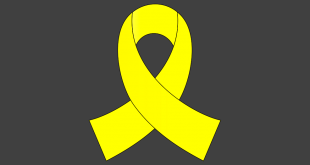Dealing with any disease is stressful and challenging. The doctors appointments, medications, and sick days are common fixtures in our lives. Unfortunately with endometriosis, surgery often happens more than once throughout a warrior’s lifetime with the disease. At this point, endometriosis can only be officially diagnosed through a diagnostic laparoscopy. Facing an incurable illness diagnosis is scary enough on its own but when it is accompanied by surgery, it can be a stressful and frightening time.
When I was diagnosed with endometriosis at the age of 22, I had never had surgery before. I had only been in the hospital as a very young child for a bad case of the flu and only have vague memories of the experience. So when my doctor discussed the prospect of surgery, I was incredibly scared. I was hours away from home. I had only known this doctor for a couple weeks. The thought of anesthesia terrified me thanks to an article I had read once in high school anatomy class. Needless to say I had a lot of questions before that first surgery.
I’ve had 3 surgeries since then (as well as multiple colonoscopies and upper endoscopies) so I consider myself a veteran of hospital stays and hope that my experience can offer a bit of hope and answers for those preparing for their first (or second or third) surgeries. Here are some things to keep in mind:
1- Make a list of questions. Regardless of how insignificant (or even silly) you think they may be, ask them. I can guarantee that you will not be the first person that did. Keep a piece of paper with you as you prepare for pre-op so that you can jot questions down as they come to your mind. Whether it pertains to the prep, anesthesia, or after care, the pre-op consultation will be the best time to ask and don’t leave until you feel like your questions have been answered. No question is insignificant when it comes to your health. It will take a weight off your shoulders the day of surgery if you’ve already had your questions answered. The book Coping With Endometriosis has an excellent appendix with a list of questions to ask both your doctor and anesthesiologist. This is a great book to have as a resource so I highly recommend it!
2. Buy cute (and comfy) pajamas for after surgery. This is not really a necessity but believe me it can go a long way! Appearance is not necessarily the top of your priority list and you are already going to feel rough from the surgery so why not prepare in advance for something to make you feel good? I’ve had 4 surgeries and I have always made sure to buy a special pair of PJs for each one and they usually made me smile. If you are having an abdominal surgery (such a laparotomy versus a lap) you will want to buy a nightshirt versus PJs with pants and believe me you won’t want ANYTHING going near that incision site for awhile. Same goes with underwear. I know the mesh panties from the hospital aren’t the hottest things around but they work well post-op.
3. Pack the essentials in your bag. Things that I always wanted after surgery but always forgot was lotion and chapstick. Hospitals have really dry air which can dry your lips out plus after have a tube down your throat, you will want the added moisture. I always got really itchy too from dry skin which was not fun combined with itchiness I always get from pain medications. Other essentials include deodorant, toothbrush and toothpaste, and a hairbrush. Also if you wear contacts, don’t forget your solution, case, and backup glasses (if you have them). Depending on how long your hospital stay is, you may want to pack soap and shampoo even though most hospitals provide them. With my hysterectomy, I was in the hospital 4 days and I was definitely ready for a shower by day 3. I also recommend packing a pillow not only for the hospital but for the car ride home to place between yourself and the seat belt as the lap belt almost always lands right across your incision sites.
4. Stock up on movies and light reading material. This is important for both the hospital and for home. Daytime television gets old fast so post-op is a great time to give a Netflix trial a whirl or check out Redbox for some movies on the cheap. I chose “light reading” as chances are for at least the first couple days post-op it will be hard to concentrate for any length of time or think too deeply because of pain, meds, and exhaustion. I liked having a variety of magazines to flip through. Puzzle books are good to have too (I chose word finds so I wouldn’t have to think to logically!).
5. Get your post-op prescriptions filled before your surgery. Its important to have them waiting on you at home so you won’t have any lag time between doses. I made this mistake not only once but twice. You would think I would have learned. I did get my pain medicationss filled before surgery the second time but didn’t fill the anti-nausea medicine and I was really kicking myself when I was released.
6. Stock up on “soft” foods for post-op. Your appetite may return faster than your GI system wakes up so be sure to take it slowly when you resume eating. You may also have nausea from the anesthesia, pain medications, or both so soft foods will work in your favor. Things you may consider are soups (like chicken noodle), crackers, toast, or scrambled eggs (what I always eat after surgery or other procedure). You may also want to have a stool softener on hand for when you GI system wakes up. The first time you “go” is usually pretty unpleasant.
7. Enlist help. You will need help getting around the first couple days, especially with getting up. You will realize you have many more ab muscles than you previously thought! You will also need help carrying things as you will be under a lifting restriction (typically no more than a gallon of milk). You will also need someone to remind you to take it easy as I know sometimes we warriors can have a stubborn streak and try to do too much too fast and end up paying for it!
I hope this list helps! If you are a surgery veteran, why advice do you have for a newbie awaiting surgery?
This article is intended to convey general educational information and should not be relied upon as a substitute for professional healthcare advice.




My best advice for surgery is heal, don’t deal! I have a huge family and EVERYBODY wanted to come visit, but I didn’t have the spoons & knew I’d get cranky so I explained that after I was feeling a bit better we’d schedule a time for them to come see me. My best friend made a planner & was like my personal assistant for 6 weeks! It was great & I kept my spoons for healing not dealing!
Does anyone have a list of questions that is typical to ask before endometriosis surgery or a link to something? I’m not even sure where to start! My dr. said we’ll discuss what can and cannot be cut prior to the surgery, but I want a little guidance in advance about some questions. Thanks!